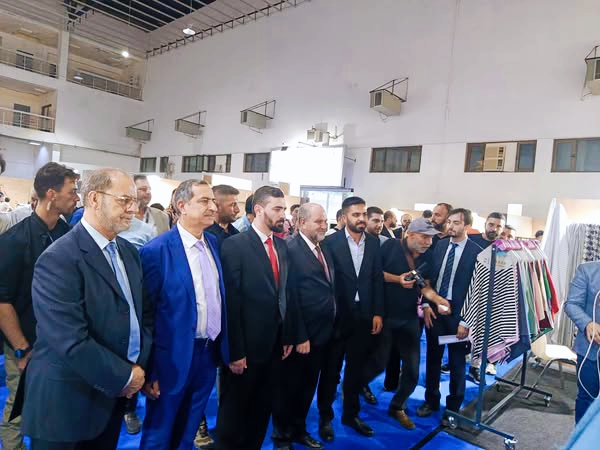The first edition of the Turkish textile exhibition for textile machinery and supplies kicked off today in the capital, Damascus, with the participation of more than 40 Turkish companies specializing in the textile industry and its equipment.
In a special statement, the Turkish Ambassador to Syria, Dr. Baran Oğlu, emphasized the need to support Syrian industrialists and provide facilities to enable them to open up to global markets, noting that Syria is in a new phase that requires enhancing industrial and economic cooperation between the two countries. He said:
"We discuss daily ways to develop relations, and it is possible to submit proposals to the relevant ministers to study ways to support the Syrian industry".
* Established Syrian Industry with High Added Value
On the other hand, the President of the Damascus Chamber of Industry, Ayman Moulawi, highlighted the depth of the Syrian industry, especially in the field of garment and fabric manufacturing, emphasizing the presence of locally produced fabrics, especially in Aleppo, while factories need other types of fabrics to complete the production process.
Moulawi confirmed that Syrian workers possess high skills in the garment industry, and the low labor costs are a competitive advantage for national products compared to Turkish products. He expected the Syrian textile industry to continue to compete in local and international markets.
Moulawi also mentioned that the Chamber requested the government to reduce electricity prices to support the industry, and while the government partially responded, he stressed that the reduction is still insufficient. He also called for higher customs duties on imported finished products to protect national products, indicating that these demands are still under discussion with government authorities.
* Exporting is the Primary Goal
On his part, a member of the Aleppo Chamber of Commerce, Ahmed Sabouni, affirmed that exporting is essential for driving Syrian trade, pointing out that the most important markets for Syrian goods are Jordan, Iraq, and the Gulf countries. He called for customs and shipping facilitations from sister countries, especially from Turkey.
Sabouni urged the Turkish side to reduce customs duties on Syrian products from 40% to 10%, to match the fees imposed by Syria on Turkish goods, aiming to create a trade balance and stimulate industrial exchange between the two countries.
* Protecting Local Products and Improving Production Conditions
As for Ahmed Mahdi Kheder, a member of the Aleppo Chamber of Industry, he emphasized the importance of setting clear standards to protect national products, calling for a study of customs duties that support local industry and contribute to its development.
Kheder stressed that foreign exhibitions contribute to improving the quality of local production, urging the government to reform the customs duty system and reduce the costs of energy carriers such as electricity, fuel, and diesel. He noted that the electricity price in Turkey ranges between 10-12 cents, while in Syria, it is 20-23 cents, posing a significant burden on Syrian industrialists.
* Turkish Investors: Bright Future for Investment in Syria
On the other hand, the owner of the Turkish company "Gözenci Makina", specializing in setting up facilities for official clothing production, expressed optimism about the future of investment in Syria. He mentioned that his company provides integrated solutions for establishing "turnkey" factories and attended Syria to participate in the exhibition, confirming that the Syrian investment environment holds promising prospects for expansion and growth.
* Companies Returning After the War
The commercial director of "Şerbatçı" company explained that his company has been operating in Syria since 1980 but had to close its factories during the war and expand in Turkey and Egypt. Today, the company is working on rehabilitating its affected factories, expecting production to resume at the beginning of next year.
He affirmed that the Syrian market is promising and has great potential, but he emphasized the need for government support, especially regarding temporary imports, which are an important tool for exports, in addition to customs cooperation between the Syrian and Turkish governments to serve the interests of industrialists in both countries.
He also pointed out that the cost of electricity and gas in Syria is still high compared to Turkey, urging the government to support these energy carriers to provide a competitive production environment. He praised the skill of Syrian workers and their excellence in the textile industry, stating that this human resource is one of the key success factors for any industrial project in Syria.
The exhibition serves as a platform for exchanging experiences, forming partnerships, and presenting a clear vision of the future of the textile industry in Syria, amidst economic challenges that require bold government reforms and real support for national products to boost exports and open up regional and international markets.

